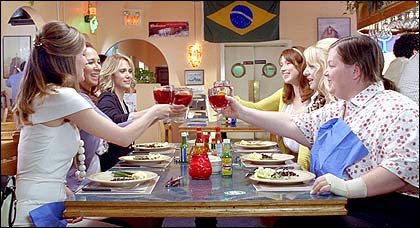
Love, Dishonor and Torment
Weddings dont bring out the best in women
by Molly Templeton
BRIDESMAIDS: Directed by Paul Feig. Written by Kristen Wiig and Annie Mumolo. Cinematography, Robert D. Yeoman. Editors, William Kerr and Mike Sale. Music, Michael Andrews. Starring Kristen Wiig, Maya Rudolph, Melissa McCarthy, Chris ODowd, Jon Hamm and Rose Byrne. Universal Pictures, 2011. R. 125 minutes.
 |
There is no safe place from which to approach Bridesmaids, unless youve managed to avoid a single poster, preview, article touting it as the future of female-driven comedy or column discussing how seeing it is a requirement to support women in the movie business. If you are that as-yet-un-sold-to person, congratulations. Please hold tight to your total lack of expectations. If not, please refrain from believing any idiotic comparisons to The Hangover.
Bridesmaids, which is filled with a self-aware sense of humor that draws more knowing, painful chuckles than fully belly laughs, acts as something of a palate-cleanser after the seemingly endless list of films in which women are plot devices, love interests and little else. Sure, thirtysomething Annie Walker (Kristen Wiig) would like to have a love interest, but her problems are hardly purely man-related. A former bakery owner whose business and relationship folded simultaneously, Annie has a dead-end job she clearly loathes, a slightly kooky mother (Jill Clayburgh), a crass fuckbuddy (Jon Hamm) and a sweet best friend, Lillian (Maya Rudolph), who gets engaged about twenty minutes into the film.
Weddings, pop culture tells us, make women crazy. But Lillian has a steady head on her shoulders; its Annie who freaks, the shiny glow of Lillians engagement shining a bright glow on her own messy life. Not helping things further is the appearance of Helen (Rose Byrne), the oh-so-perfect other woman in Lillians bridal party.
For a little while, Bridesmaids is painfully effective at demonstrating that women can be competitive assholes just like everyone else. Neither Helen nor Annie will cave when one outdoes the other while speechifying at Lillians engagement party; each will take any chance to take the other down a peg, though Helen, cool and collected, appears to have a lot more practice at the underhanded destruction of her rivals via the careful application of pills and Scotch. Wiig and her co-writer and longtime friend, Annie Mumolo, sometimes milk the resulting scenes for a little more than theyre worth, and overlong transitions full of endless skylines give the film the stop-start momentum of a series of skits. But skittish or no, theres no forgetting Rudolphs Lillian sinking in horror into the street, overcome with food poisoning.
Wiig, as fearless an actress as ever, embraces Annies mess, her negativity and her attempts to do the right thing, while her script is carefully balanced so that were never entirely laughing at Annie; theres always a moment of painful recognition, even when Annie is at her worst. Selectively self-destructive and scared of being left behind, Annie is Bridesmaids only fully formed character. Coming in second is Rhodes (Chris ODowd), a gently charming cop who takes a shine to Annie, and whose character doesnt exactly belong in the film. His presence emphasizes Annies inability to reach for positive change, but when Bridesmaids turns its attention to him, its focus shifts from the thing the film does best ãproviding a sweet-and-sour take on female friendship, competition and the pressure to be whats expected of you.